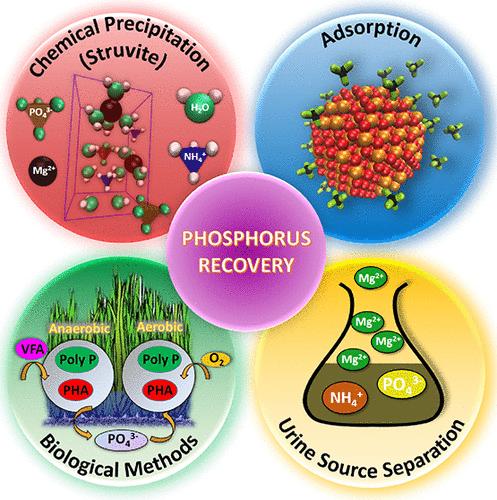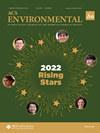磷酸盐去除和回收技术的最新进展:综述
IF 6.7
Q1 ENGINEERING, ENVIRONMENTAL
引用次数: 0
摘要
磷是一种不可再生资源,但却是作物肥料中不可或缺的养分,有助于满足日益增长的农业和粮食需求。作为初级生产者的一种限制性养分,过量的磷通过农业径流进入水源会导致下游水体富营养化。因此,为了解决与磷矿石储量枯竭相关的全球性问题,并最大限度地减少水体富营养化,许多研究都采用了各种化学、物理和生物方法来研究如何去除和回收可用形式的磷酸盐。本综述对相关文献进行了全面而严谨的评估,重点介绍了从各种废水中回收磷酸盐时广泛采用的吸附法和化学沉淀法。重点介绍了一些实验性能参数,包括温度、pH 值、共存离子(如 NO3-、HCO3-、Cl-、SO42-)、表面积、孔隙率和煅烧,因为这些参数对优化吸附能力和硬石膏结晶/沉淀非常重要。此外,还讨论了各种选定吸附剂和沉淀的闪石晶体的形态和结构特征。本文章由计算机程序翻译,如有差异,请以英文原文为准。

Recent Advances in Technologies for Phosphate Removal and Recovery: A Review
Phosphorus is a nonrenewable resource, yet an essential nutrient in crop fertilizers that helps meet growing agricultural and food demands. As a limiting nutrient for primary producers, an excess amount of phosphorus entering water sources through agricultural runoff can lead to eutrophication events downstream. Therefore, to address global issues associated with the depletion of phosphate rock reserves and minimize the eutrophication of water bodies, numerous studies have investigated the removal and recovery of phosphates in usable forms using various chemical, physical, and biological methods. This review provides a comprehensive and critical evaluation of the literature, focusing on the widely employed adsorption and chemical precipitation for phosphate recovery from various wastewaters. Several experimental performance parameters including temperature, pH, coexisting ions (e.g., NO3–, HCO3–, Cl–, SO42–), surface area, porosity, and calcination are highlighted for their importance in optimizing adsorption capacity and struvite crystallization/precipitation. Furthermore, the morphological and structural characterization of various selected adsorbents and precipitated struvite crystals is discussed.
求助全文
通过发布文献求助,成功后即可免费获取论文全文。
去求助
来源期刊

ACS Environmental Au
环境科学-
CiteScore
7.10
自引率
0.00%
发文量
0
期刊介绍:
ACS Environmental Au is an open access journal which publishes experimental research and theoretical results in all aspects of environmental science and technology both pure and applied. Short letters comprehensive articles reviews and perspectives are welcome in the following areas:Alternative EnergyAnthropogenic Impacts on Atmosphere Soil or WaterBiogeochemical CyclingBiomass or Wastes as ResourcesContaminants in Aquatic and Terrestrial EnvironmentsEnvironmental Data ScienceEcotoxicology and Public HealthEnergy and ClimateEnvironmental Modeling Processes and Measurement Methods and TechnologiesEnvironmental Nanotechnology and BiotechnologyGreen ChemistryGreen Manufacturing and EngineeringRisk assessment Regulatory Frameworks and Life-Cycle AssessmentsTreatment and Resource Recovery and Waste Management
 求助内容:
求助内容: 应助结果提醒方式:
应助结果提醒方式:


